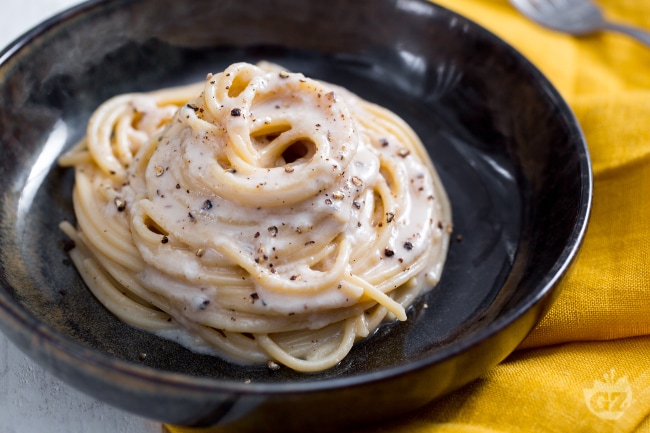

“Yes, life is a mozzico, here you mozzico well”. This is one of the typical phrases that introduce the menus in Roman trattorias or fraschette. But the Bacon and egg and theTomato and bacon, like spaghetti cacio e pepe, have now become symbolic dishes of Italy, made with DOP ingredients linked to the traditions of the territories in which they were born. An excellence that from the “checkered tablecloths” arrives in the kitchens of the great Chefs, as in the case of spaghetti with cheese, pepper and sea urchins. We too want to pay homage to one of the symbols of good and genuine eating, showing you how to make a perfect cacio e pepe! The chemical combination of water and Pecorino proteins, essential for obtaining a cream without lumps, the whole peppercorns crushed at the moment and toasted in a pan to release all their pungent aroma, the slowly creamed pasta to absorb all the flavor of the Roman Pecorino … and above all, prepare and enjoy: another rule for enjoying spaghetti cacio e pepe at its best!
Find out how many first dishes can be made inspired by this great classic:
Read the recipe in English
To prepare the cacio e pepe spaghetti, first put a pot on the stove with the water to cook the pasta: fill it with about half of the water you usually use, in this way it will be richer in starch. In the meantime, grate the Roman Pecorino 1 and transfer almost all of it into a bowl, keeping some aside for plating. When the water has come to a boil, add salt and add the spaghetti 2. Meanwhile pound the peppercorns with a meat mallet (or use a grinder leaving it rather slow in order to have even larger pieces of pepper) 3.
Pour the pepper into a large non-stick pan 4 and toast it over low heat, stirring with a wooden spoon. Deglaze with a couple of ladles of the pasta cooking water 5. Keep stirring over low heat 6.
Drain the spaghetti 2-3 minutes before the time indicated on the package and transfer them to the pan, taking care to conserve the cooking water 7. Finish cooking the spaghetti in the pan, risottandoli, then adding hot water as needed 8 and stirring constantly with tongs 9. Wait until the bottom of the pan is almost dry before adding more water.
You can prepare the Pecorino cream (do not start earlier because it would tend to thicken or be too cold compared to the temperature of the pasta): pour a ladle of hot cooking water into the bowl with the grated Pecorino 10then mix vigorously with a hand whisk 11. The consistency you’ll need to get is more pasty than creamy, don’t worry if it’s very dry. If, once the cream is ready, the pasta is not ready for creaming, place the bowl briefly on the pan with the hot water, continuing to mix with the whisk, so as to have the cream at a temperature similar to that of the pasta. 12.
When the spaghetti is cooked, turn off the heat and add the Pecorino cream 13stirring constantly with the tongs 14 For the ideal creaminess, adjust by adding more Pecorino or a little cooking water as needed. Serve your spaghetti cacio e pepe by sprinkling with the remaining grated Pecorino and more freshly ground pepper to taste 15!
For this recipe, we recommend trying Rummo Spaghetti n° 3.